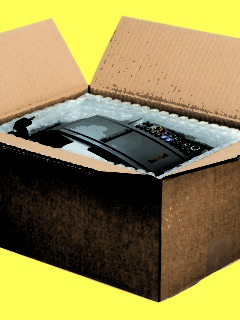What role will logistics play in the success of e-commerce stores in the near future? And what trends in logistics will have a direct impact on their growth? The answer stems from the increasing expectations of customers shopping online. Indeed, the success of e-shops is defined by the quality and ability to satisfy and retain customers.
The key needed to gain an edge over the competition lies in striking the right balance between product price, customer service and delivery time. The largest and most reputable e-commerce stores have already implemented same-day delivery to impress customers who don’t want to wait even one day for delivery, setting a clear trend in the world of online sales. Dotcom has conducted a study focusing on the e-commerce and packaging industry. The following key findings demonstrate the importance of logistics in the decision-making process of customers shopping online.
Fast delivery promotes customer loyalty
- 87% of e-shoppers say that delivery time influences their decision to buy from a retailer again.
Customers are willing to pay more for fast delivery
- 67% of shoppers would pay more for same-day delivery.
Transparency is very important to consumers when their order is in the shipping process
- 21% of shoppers would like as much information as possible about the current location of their order.
In order to be competitive, traditional retailers are adapting their stores to multi-channel sales and turning them into distribution hubs where they combine online sales with traditional brick-and-mortar sales. E-shops that cannot deliver goods quickly to their customers are slowly but surely doomed.
Gaining competitive advantage
The real challenge for e-shops is the ability to deliver goods within a few hours of ordering. Big online retailers are investing in express logistics services that can already deliver to customers within 90 minutes. In the Czech Republic and Slovakia, the biggest trend-setter is clearly Alza, which has over 90,000 products on offer. It currently operates on a total area of 70,000 square metres. It has 2 main, fully automated logistics centres in the Czech Republic and Slovakia, which enables it to handle 90,000 orders per day with an average waiting time of 7.5 minutes. As they also supply goods to other EU countries, they are planning to build a third large logistics centre in 2019, which would focus on Western Europe. With the expansion of the warehouse space, the company is also planning to expand automation, i.e. not only the warehouse operations but also the entire packaging and shipping operations should be automated.
Availability of goods and speed of delivery is essential. Alza has all the goods it has on the web in stock. For fast delivery, it uses not only external delivery companies, but also its own AlzaExpress for Prague and Bratislava. The customer can thus choose a specific hour or time period when the goods will be delivered. And if he is interested in express delivery, the express courier will deliver the package within 90 minutes (note: only in Prague for now). In order to satisfy its customers completely, the company has introduced delivery of goods even on weekends. However, the initial interest in this service declined rather quickly, so Alza is evaluating whether it will continue to provide this service.
It is not underestimating the possibility of personal collection. According to Alza, up to 1/3 of their customers still choose personal pickup as a delivery method. That is why they have installed self-service delivery boxes called AlzaBoxes in all regions of the Czech Republic and larger places in Slovakia. It is a fast, cheap and above all easy way to pick up your goods. And let’s not forget the mobile e-shop Alza StreetShop, which combines sales, dispatch and return of goods, complaints and advice (note: service only in the Czech Republic).
And what does Alza get out of it?
- Year-on-year sales increased by 22% to a record CZK 21 billion including VAT. (The company did not state the amount of profit, but we know that it earned CZK 568 million in 2015 and increased its sales by 22-26% year-on-year.)
- Year-on-year increase in orders processed by more than a million.
- A 70% year-over-year increase in the number of visits to the eshop.
There are other ways
The figures confirming Alza’s success do not include the investments it has made in warehouse logistics and technological innovation. How can e-shops that do not have or do not want to invest hundreds of millions of crowns in logistics be competitive? The solution is third-party logistics companies (3PLs) that handle orders, inventory, order logistics and returns. The use of third-party logistics companies is growing by 12% to 15% annually worldwide.
The growing trend in the use of third-party logistics companies for complex logistics can also be seen in Fortune magazine’s annual ranking of the 500 US corporations with the highest gross sales. Approximately 85% of the Fortune 500 companies use the services of 3PL companies to contribute to their success.
TheKorn Ferry Institute has published a study on outsourcing logistics. The Institute’s findings identify the benefits of using 3PL companies.
- Up to 70% of respondents in the study say that using 3PL companies has helped reduce overall logistics costs.
- Over 83% of respondents also claimed that working with 3PL logistics companies resulted in improved customer care.
The increasing speed and volume of online sales is pushing the need to find efficient logistics solutions. Therefore, the following technologies will play an important role in e-commerce logistics in the next five to fifteen years.
Big data
Investing in complex data analytics and the ability to predict customer requirements is the mantra of all big players looking to reduce the cost of delivery. In 2016, logistics company UPS invested $1 billion in collecting and analyzing so-called big data. This investment is set to start a revolution in the logistics industry by being able to analyse vast amounts of incremental and changing data from multiple previously unconnected sources in real time to optimise logistics processes, reduce costs and improve time management and delivery times. Big data should minimize the need for human labor in logistics warehouses in the future, which should transition to fully automated efficient processes.
Digital identifiers
The use of technology in logistics operations is essential to maintain customer satisfaction. Digital identifiers in the form of biometric and electronic tags enable electronic tracking of the movement of ordered goods through their unique code.
In the above-mentioned Dotcom study, more than 41% of the study participants expressed that knowing the current status and location of their ordered goods contributes to the perception of the e-shop as an excellent retailer. More than 53% of participants rated a retailer’s provision of similar information as a parameter of a good e-shop. Moreover, 47% of the study participants claimed that they did not repeat their purchase from an online retailer precisely because of low transparency about the status and location of the order from a previous purchase.
Not only tracking of specific products, but also tracking of logistics vehicles plays a significant role in providing the necessary control and in effectively planning routes for faster delivery. Vehicle tracking technologies have already surpassed manual processes in trying to coordinate the activities of vendors, partner logistics companies and customers, and are making a significant contribution to speeding up transportation. The challenge is to track shipment movements in real time.
Sensors
The use of sensors in logistics enables the identification of free space on a pallet, in a truck or warehouse, which can then be optimised.
Augmented reality technology
Logistics warehouse staff can use augmented reality glasses technology to view the goods being handled. These glasses can scan a product code, display a list of products or their specific location.
Samsung Virtual Goggles
Robots and drones
Automated robots that can replace human labor in logistics warehouses or centers, such as self-driving trucks, are among the emerging technologies in the logistics industry. An automated truck can follow an operator in a warehouse or distribution centre and, when full, make its own way to the packing room while sending another empty truck to the operator.
Drones represent another potential option in logistics, the use of which is being explored and tested by most major logistics companies. Both Mall and Alza have tested their practical use, but have stopped the project for the time being. The reason? In cities there are so-called no-fly zones, through which only police, soldiers or rescue units can fly.
Drones and autonomous vehicles
Over the past few years, the relevance and maturity of autonomous logistics has advanced. Innovations in autonomous logistics are opening up a whole new perspective on the time and routes of delivery of transported goods.
Ecology in the logistics industry
The trend towards environmental sustainability has also had a direct impact on the logistics industry, which is striving to reduce the negative impact of logistics on the environment through the introduction of new technologies. The greening trend will be most visible in the packaging industry, which is increasingly using recycled packaging materials that are environmentally friendly and represent an important part of logistics. The use of digital identifiers and significant optimisation in the planning of logistics vehicle routes will also have an impact on reducing emissions, mirroring the principle of ‘think more, drive less’, which loosely translates as ‘think more, drive less’.














